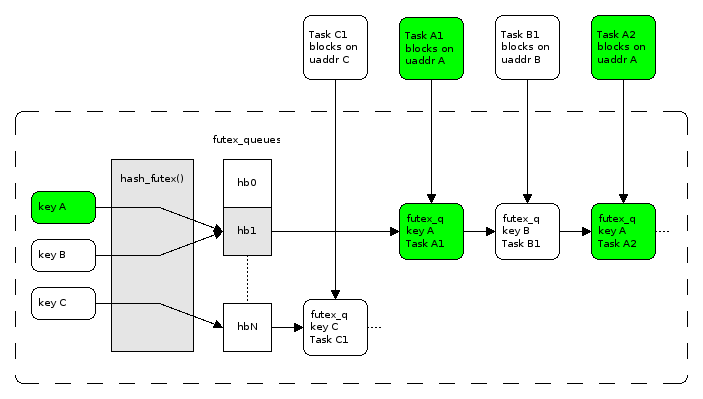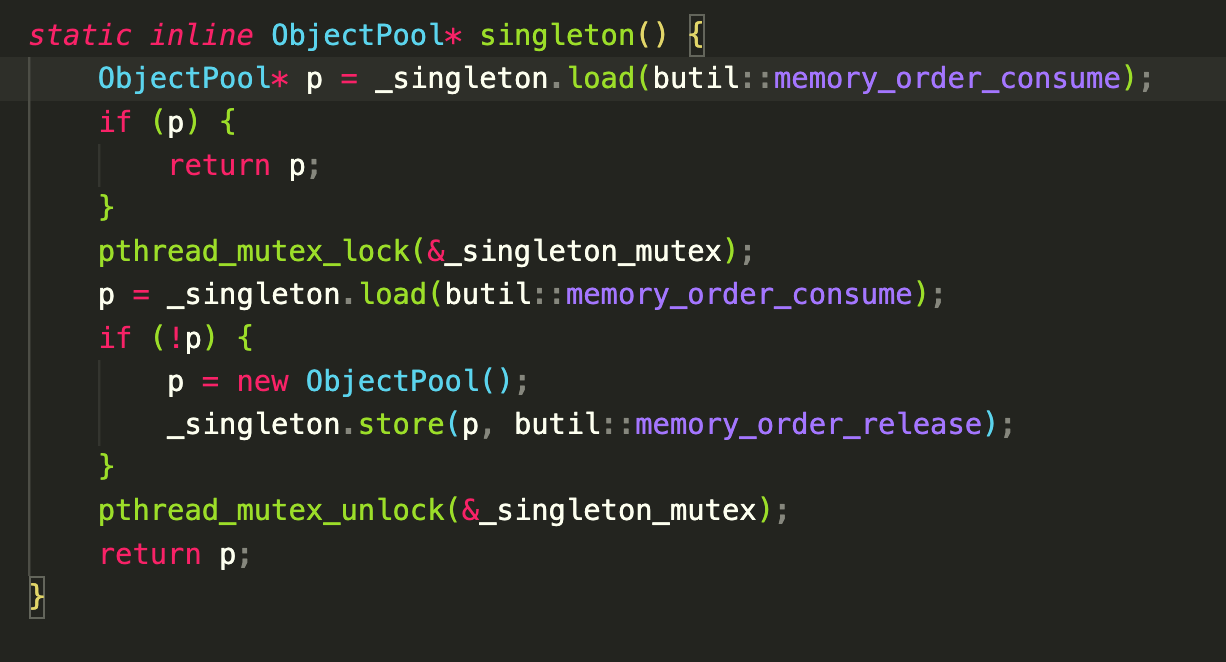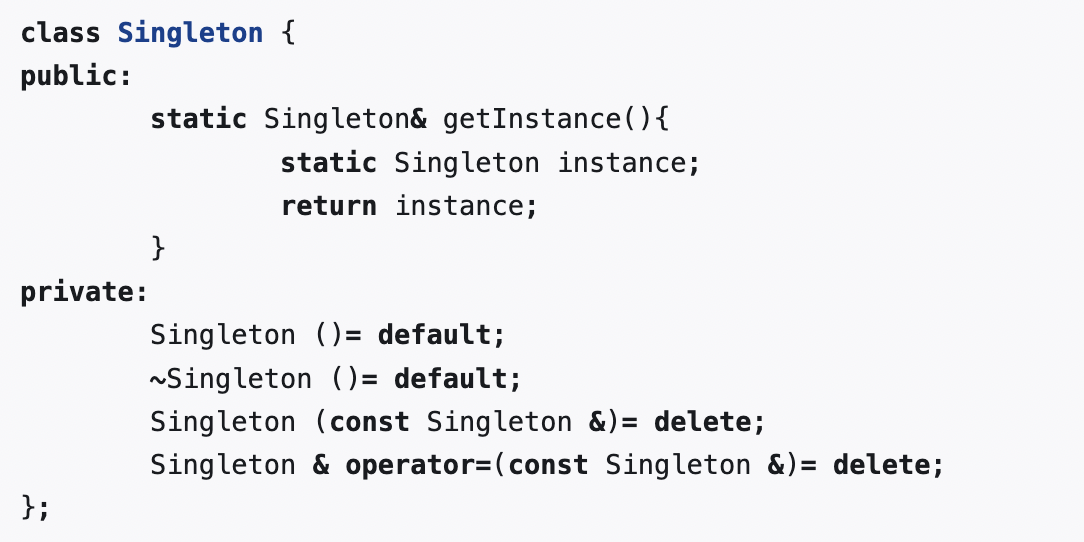之前在https://www.yuque.com/treblez/qksu6c/nqe8ip59cwegl6rk?singleDoc# 《olap/clickhouse-编译器优化与向量化》中我谈过brpc的汇编控制bthread。本文就来看一下brpc作为一个高性能的rpc实现,除了自定义线程栈之外,代码还有什么优秀之处。
因为时间原因,本文不做深入分析,只是解读下几个有意思的模块。
用户态futex
brpc中worker间的状态同步是通过ParkingLot来实现的,ParkingLot就是一个futex的封装类,我们看下brpc如何实现的futex。注意这里的futex不是bthread的futex,而是实现的pthread系统futex。
https://github.com/apache/brpc/blob/master/src/bthread/sys_futex.cpp
一个标准的手写futex,在OS_MACOSX中使用(原因是macos没有实现futex)。
我们都知道,linux里面使用spinlock + futex作为pthread_mutex的实现(https://lwn.net/Articles/360699/):

那我们在用户态没有唤醒线程队列的能力,怎么实现一个futex呢?答案是用mutex控制临界区(代表互斥锁的那个全局变量)访问,condition_variable实现睡眠和唤醒。
brpc给了一个教科书级别的实现,pthread_once + unordered_map:
// Licensed to the Apache Software Foundation (ASF) under one
// or more contributor license agreements. See the NOTICE file
// distributed with this work for additional information
// regarding copyright ownership. The ASF licenses this file
// to you under the Apache License, Version 2.0 (the
// "License"); you may not use this file except in compliance
// with the License. You may obtain a copy of the License at
//
// http://www.apache.org/licenses/LICENSE-2.0
//
// Unless required by applicable law or agreed to in writing,
// software distributed under the License is distributed on an
// "AS IS" BASIS, WITHOUT WARRANTIES OR CONDITIONS OF ANY
// KIND, either express or implied. See the License for the
// specific language governing permissions and limitations
// under the License.// bthread - An M:N threading library to make applications more concurrent.// Date: Wed Mar 14 17:44:58 CST 2018#include "bthread/sys_futex.h"
#include "butil/scoped_lock.h"
#include "butil/atomicops.h"
#include <pthread.h>
#include <unordered_map>#if defined(OS_MACOSX)namespace bthread {class SimuFutex {
public:SimuFutex() : counts(0), ref(0) {pthread_mutex_init(&lock, NULL);pthread_cond_init(&cond, NULL);}~SimuFutex() {pthread_mutex_destroy(&lock);pthread_cond_destroy(&cond);}public:pthread_mutex_t lock;pthread_cond_t cond;// 有多少线程在等待int32_t counts;// 有多少线程有所有权int32_t ref;
};static pthread_mutex_t s_futex_map_mutex = PTHREAD_MUTEX_INITIALIZER;
static pthread_once_t init_futex_map_once = PTHREAD_ONCE_INIT;
// 和linux中的hash_futex() + 队列实现类似
static std::unordered_map<void*, SimuFutex>* s_futex_map = NULL;
static void InitFutexMap() {// Leave memory to process's clean up.s_futex_map = new (std::nothrow) std::unordered_map<void*, SimuFutex>();if (NULL == s_futex_map) {exit(1);}return;
}int futex_wait_private(void* addr1, int expected, const timespec* timeout) {// pthread_once用于控制多线程中某个函数只会被初始化一次// init_futex_map_once 是一个pthread_once_t变量,必须全局可见// 如果调用出错,那么返回非零值if (pthread_once(&init_futex_map_once, InitFutexMap) != 0) {LOG(FATAL) << "Fail to pthread_once";exit(1);}std::unique_lock<pthread_mutex_t> mu(s_futex_map_mutex);SimuFutex& simu_futex = (*s_futex_map)[addr1];++simu_futex.ref;mu.unlock();int rc = 0;{std::unique_lock<pthread_mutex_t> mu1(simu_futex.lock);// 冲突,并等待,使用内核态函数mutexif (static_cast<butil::atomic<int>*>(addr1)->load() == expected) {++simu_futex.counts;if (timeout) {timespec timeout_abs = butil::timespec_from_now(*timeout);if ((rc = pthread_cond_timedwait(&simu_futex.cond, &simu_futex.lock, &timeout_abs)) != 0) {errno = rc;rc = -1;}} else {if ((rc = pthread_cond_wait(&simu_futex.cond, &simu_futex.lock)) != 0) {errno = rc;rc = -1;}}--simu_futex.counts;} else {errno = EAGAIN;rc = -1;}}std::unique_lock<pthread_mutex_t> mu1(s_futex_map_mutex);if (--simu_futex.ref == 0) {s_futex_map->erase(addr1);}mu1.unlock();return rc;
}// 能控制唤醒线程数的wake
int futex_wake_private(void* addr1, int nwake) {if (pthread_once(&init_futex_map_once, InitFutexMap) != 0) {LOG(FATAL) << "Fail to pthread_once";exit(1);}std::unique_lock<pthread_mutex_t> mu(s_futex_map_mutex);auto it = s_futex_map->find(addr1);if (it == s_futex_map->end()) {mu.unlock();return 0;}SimuFutex& simu_futex = it->second;++simu_futex.ref;mu.unlock();int nwakedup = 0;int rc = 0;{std::unique_lock<pthread_mutex_t> mu1(simu_futex.lock);nwake = (nwake < simu_futex.counts)? nwake: simu_futex.counts;for (int i = 0; i < nwake; ++i) {if ((rc = pthread_cond_signal(&simu_futex.cond)) != 0) {errno = rc;break;} else {++nwakedup;}}}std::unique_lock<pthread_mutex_t> mu2(s_futex_map_mutex);if (--simu_futex.ref == 0) {s_futex_map->erase(addr1);}mu2.unlock();return nwakedup;
}} // namespace bthread#endifbthread创建
bthread并不是在用户态栈上创建的,而是通过malloc/mmap:
int allocate_stack_storage(StackStorage* s, int stacksize_in, int guardsize_in) {const static int PAGESIZE = getpagesize();const int PAGESIZE_M1 = PAGESIZE - 1;const int MIN_STACKSIZE = PAGESIZE * 2;const int MIN_GUARDSIZE = PAGESIZE;// Align stacksizeconst int stacksize =(std::max(stacksize_in, MIN_STACKSIZE) + PAGESIZE_M1) &~PAGESIZE_M1;if (guardsize_in <= 0) {void* mem = malloc(stacksize);if (NULL == mem) {PLOG_EVERY_SECOND(ERROR) << "Fail to malloc (size="<< stacksize << ")";return -1;}s_stack_count.fetch_add(1, butil::memory_order_relaxed);s->bottom = (char*)mem + stacksize;s->stacksize = stacksize;s->guardsize = 0;if (RunningOnValgrind()) {s->valgrind_stack_id = VALGRIND_STACK_REGISTER(s->bottom, (char*)s->bottom - stacksize);} else {s->valgrind_stack_id = 0;}return 0;} else {// Align guardsizeconst int guardsize =(std::max(guardsize_in, MIN_GUARDSIZE) + PAGESIZE_M1) &~PAGESIZE_M1;const int memsize = stacksize + guardsize;void* const mem = mmap(NULL, memsize, (PROT_READ | PROT_WRITE),(MAP_PRIVATE | MAP_ANONYMOUS), -1, 0);if (MAP_FAILED == mem) {PLOG_EVERY_SECOND(ERROR) << "Fail to mmap size=" << memsize << " stack_count="<< s_stack_count.load(butil::memory_order_relaxed)<< ", possibly limited by /proc/sys/vm/max_map_count";// may fail due to limit of max_map_count (65536 in default)return -1;}void* aligned_mem = (void*)(((intptr_t)mem + PAGESIZE_M1) & ~PAGESIZE_M1);if (aligned_mem != mem) {LOG_ONCE(ERROR) << "addr=" << mem << " returned by mmap is not ""aligned by pagesize=" << PAGESIZE;}const int offset = (char*)aligned_mem - (char*)mem;if (guardsize <= offset ||mprotect(aligned_mem, guardsize - offset, PROT_NONE) != 0) {munmap(mem, memsize);PLOG_EVERY_SECOND(ERROR) << "Fail to mprotect " << (void*)aligned_mem << " length="<< guardsize - offset; return -1;}s_stack_count.fetch_add(1, butil::memory_order_relaxed);s->bottom = (char*)mem + memsize;s->stacksize = stacksize;s->guardsize = guardsize;if (RunningOnValgrind()) {s->valgrind_stack_id = VALGRIND_STACK_REGISTER(s->bottom, (char*)s->bottom - stacksize);} else {s->valgrind_stack_id = 0;}return 0;}
}创建之后,会执行一段汇编代码(bthread_make_fcontext):
template <typename StackClass> struct StackFactory {struct Wrapper : public ContextualStack {explicit Wrapper(void (*entry)(intptr_t)) {if (allocate_stack_storage(&storage, *StackClass::stack_size_flag,FLAGS_guard_page_size) != 0) {storage.zeroize();context = NULL;return;}context = bthread_make_fcontext(storage.bottom, storage.stacksize, entry);stacktype = (StackType)StackClass::stacktype;}~Wrapper() {if (context) {context = NULL;deallocate_stack_storage(&storage);storage.zeroize();}}};static ContextualStack* get_stack(void (*entry)(intptr_t)) {return butil::get_object<Wrapper>(entry);}static void return_stack(ContextualStack* sc) {butil::return_object(static_cast<Wrapper*>(sc));}
};
虽然contex.cpp里面的汇编代码看起来多,但是一个bthread_make_fcontext就根据平台不同实现了九遍,这个故事告诉我们要珍爱生命,远离汇编。
以linux_x86为例,我们看看这里做了什么:
#if defined(BTHREAD_CONTEXT_PLATFORM_linux_x86_64) && defined(BTHREAD_CONTEXT_COMPILER_gcc)
__asm (
".text\n"
".globl bthread_make_fcontext\n"
".type bthread_make_fcontext,@function\n"
".align 16\n"
"bthread_make_fcontext:\n"// 第一个参数的值作为栈基址
" movq %rdi, %rax\n"// 16字节对齐
" andq $-16, %rax\n"// 减去0x48,存储上下文信息
" leaq -0x48(%rax), %rax\n"// 寄存器偏移 0x38 的位置 存储栈大小
" movq %rdx, 0x38(%rax)\n"// 保存浮点数运算的状态
" stmxcsr (%rax)\n"// 保存FPU 控制字寄存器
" fnstcw 0x4(%rax)\n"// 将 finish 标签的地址存储到 %rcx 寄存器中
" leaq finish(%rip), %rcx\n"// 保存协程结束点位置
" movq %rcx, 0x40(%rax)\n"
" ret \n"
"finish:\n"
" xorq %rdi, %rdi\n"
" call _exit@PLT\n"// 退出失败,程序挂起
" hlt\n"
".size bthread_make_fcontext,.-bthread_make_fcontext\n"
".section .note.GNU-stack,\"\",%progbits\n"
".previous\n"
);对象池
brpc没有实现自己的内存分配器,但是做了对象池缓存。
对象池是个单例实现,brpc用了C++11但是并没有用Meyers’ Singleton来创建这个静态单例,而是用static_atomic解决静态变量加载顺序的问题:
template <typename T>
butil::static_atomic<ObjectPool<T>*> ObjectPool<T>::_singleton = BUTIL_STATIC_ATOMIC_INIT(NULL);
加上经典的单例实现:

我没找到不用Meyers’ Singleton的理由,或许可以改进一下?(Meyers’ Singleton如下所示)

对象池的获取逻辑被实现为了一个宏,依次从local free chunk、global free chunk获取对象。
这里还注释了对于POD类型,brpc用new T替代new T(),省去赋值0的开销。
// We need following macro to construct T with different CTOR_ARGS// which may include parenthesis because when T is POD, "new T()"// and "new T" are different: former one sets all fields to 0 which// we don't want.
#define BAIDU_OBJECT_POOL_GET(CTOR_ARGS) \/* Fetch local free ptr */ \if (_cur_free.nfree) { \BAIDU_OBJECT_POOL_FREE_ITEM_NUM_SUB1; \return _cur_free.ptrs[--_cur_free.nfree]; \} \/* Fetch a FreeChunk from global. \TODO: Popping from _free needs to copy a FreeChunk which is \costly, but hardly impacts amortized performance. */ \if (_pool->pop_free_chunk(_cur_free)) { \BAIDU_OBJECT_POOL_FREE_ITEM_NUM_SUB1; \return _cur_free.ptrs[--_cur_free.nfree]; \} \/* Fetch memory from local block */ \if (_cur_block && _cur_block->nitem < BLOCK_NITEM) { \T* obj = new ((T*)_cur_block->items + _cur_block->nitem) T CTOR_ARGS; \if (!ObjectPoolValidator<T>::validate(obj)) { \obj->~T(); \return NULL; \} \++_cur_block->nitem; \return obj; \} \/* Fetch a Block from global */ \_cur_block = add_block(&_cur_block_index); \if (_cur_block != NULL) { \T* obj = new ((T*)_cur_block->items + _cur_block->nitem) T CTOR_ARGS; \if (!ObjectPoolValidator<T>::validate(obj)) { \obj->~T(); \return NULL; \} \++_cur_block->nitem; \return obj; \} \return NULL; \和大多数内存池实现一样,归还的时候先往thread local放,再往global pool放:
inline int return_object(T* ptr) {// Return to local free listif (_cur_free.nfree < ObjectPool::free_chunk_nitem()) {_cur_free.ptrs[_cur_free.nfree++] = ptr;BAIDU_OBJECT_POOL_FREE_ITEM_NUM_ADD1;return 0;}// Local free list is full, return it to global.// For copying issue, check comment in upper get()if (_pool->push_free_chunk(_cur_free)) {_cur_free.nfree = 1;_cur_free.ptrs[0] = ptr;BAIDU_OBJECT_POOL_FREE_ITEM_NUM_ADD1;return 0;}return -1;}
TaskGroup
这里的任务调度主要是task_runner,task_runner通过调用ending_sched来进行task steal。
void TaskGroup::ending_sched(TaskGroup** pg) {TaskGroup* g = *pg;bthread_t next_tid = 0;// Find next task to run, if none, switch to idle thread of the group.
#ifndef BTHREAD_FAIR_WSQ// When BTHREAD_FAIR_WSQ is defined, profiling shows that cpu cost of// WSQ::steal() in example/multi_threaded_echo_c++ changes from 1.9%// to 2.9%const bool popped = g->_rq.pop(&next_tid);
#elseconst bool popped = g->_rq.steal(&next_tid);
#endifif (!popped && !g->steal_task(&next_tid)) {// Jump to main task if there's no task to run.next_tid = g->_main_tid;}TaskMeta* const cur_meta = g->_cur_meta;TaskMeta* next_meta = address_meta(next_tid);if (next_meta->stack == NULL) {if (next_meta->stack_type() == cur_meta->stack_type()) {// also works with pthread_task scheduling to pthread_task, the// transfered stack is just _main_stack.next_meta->set_stack(cur_meta->release_stack());} else {ContextualStack* stk = get_stack(next_meta->stack_type(), task_runner);if (stk) {next_meta->set_stack(stk);} else {// stack_type is BTHREAD_STACKTYPE_PTHREAD or out of memory,// In latter case, attr is forced to be BTHREAD_STACKTYPE_PTHREAD.// This basically means that if we can't allocate stack, run// the task in pthread directly.next_meta->attr.stack_type = BTHREAD_STACKTYPE_PTHREAD;next_meta->set_stack(g->_main_stack);}}}sched_to(pg, next_meta);
}在ending_sched()中,会有依次从TG的rq、remote_rq取任务,找不到再窃取其他TG的任务,如果都找不到任务,则设置_cur_meta为_main_tid,然后就会回到run_main_task()的主循环,继续wait_task()等待新任务。
找到任务后,执行sched_to跳转到新任务。
void TaskGroup::sched_to(TaskGroup** pg, TaskMeta* next_meta) {TaskGroup* g = *pg;
#ifndef NDEBUGif ((++g->_sched_recursive_guard) > 1) {LOG(FATAL) << "Recursively(" << g->_sched_recursive_guard - 1<< ") call sched_to(" << g << ")";}
#endif// Save errno so that errno is bthread-specific.const int saved_errno = errno;void* saved_unique_user_ptr = tls_unique_user_ptr;TaskMeta* const cur_meta = g->_cur_meta;const int64_t now = butil::cpuwide_time_ns();const int64_t elp_ns = now - g->_last_run_ns;g->_last_run_ns = now;cur_meta->stat.cputime_ns += elp_ns;if (cur_meta->tid != g->main_tid()) {g->_cumulated_cputime_ns += elp_ns;}++cur_meta->stat.nswitch;++ g->_nswitch;// Switch to the taskif (__builtin_expect(next_meta != cur_meta, 1)) {g-> = next_meta;// Switch tls_blscur_meta->local_storage = tls_bls;tls_bls = next_meta->local_storage;// Logging must be done after switching the local storage, since the logging lib// use bthread local storage internally, or will cause memory leak.if ((cur_meta->attr.flags & BTHREAD_LOG_CONTEXT_SWITCH) ||(next_meta->attr.flags & BTHREAD_LOG_CONTEXT_SWITCH)) {LOG(INFO) << "Switch bthread: " << cur_meta->tid << " -> "<< next_meta->tid;}if (cur_meta->stack != NULL) {if (next_meta->stack != cur_meta->stack) {jump_stack(cur_meta->stack, next_meta->stack);// probably went to another group, need to assign g again.g = BAIDU_GET_VOLATILE_THREAD_LOCAL(tls_task_group);}
#ifndef NDEBUGelse {// else pthread_task is switching to another pthread_task, sc// can only equal when they're both _main_stackCHECK(cur_meta->stack == g->_main_stack);}
#endif}// else because of ending_sched(including pthread_task->pthread_task)} else {LOG(FATAL) << "bthread=" << g->current_tid() << " sched_to itself!";}while (g->_last_context_remained) {RemainedFn fn = g->_last_context_remained;g->_last_context_remained = NULL;fn(g->_last_context_remained_arg);g = BAIDU_GET_VOLATILE_THREAD_LOCAL(tls_task_group);}// Restore errnoerrno = saved_errno;// tls_unique_user_ptr probably changed.BAIDU_SET_VOLATILE_THREAD_LOCAL(tls_unique_user_ptr, saved_unique_user_ptr);#ifndef NDEBUG--g->_sched_recursive_guard;
#endif*pg = g;
}通过传入的参数:next_tid找到TM:next_meta,和对应的ContextualStack信息:stk。
如果task_meta切换了,那么调用jump_stack
while (g->_last_context_remained) {RemainedFn fn = g->_last_context_remained;g->_last_context_remained = NULL;fn(g->_last_context_remained_arg);g = tls_task_group;}// Restore errnoerrno = saved_errno;tls_unique_user_ptr = saved_unique_user_ptr;*pg = g;
jump_stack把函数调用方的相关寄存器入栈,也就是保存调用方的运行环境。在当前函数执行结束之后要从栈中还原数据到相应的寄存器中,从而让调用方继续执行。所以末尾有出栈操作。
#if defined(BTHREAD_CONTEXT_PLATFORM_linux_x86_64) && defined(BTHREAD_CONTEXT_COMPILER_gcc)
__asm (
".text\n"
".globl bthread_jump_fcontext\n"
".type bthread_jump_fcontext,@function\n"
".align 16\n"
"bthread_jump_fcontext:\n"
" pushq %rbp \n"
" pushq %rbx \n"
" pushq %r15 \n"
" pushq %r14 \n"
" pushq %r13 \n"
" pushq %r12 \n"
" leaq -0x8(%rsp), %rsp\n"
" cmp $0, %rcx\n"
" je 1f\n"
" stmxcsr (%rsp)\n"
" fnstcw 0x4(%rsp)\n"
"1:\n"
" movq %rsp, (%rdi)\n"
" movq %rsi, %rsp\n"
" cmp $0, %rcx\n"
" je 2f\n"
" ldmxcsr (%rsp)\n"
" fldcw 0x4(%rsp)\n"
"2:\n"
" leaq 0x8(%rsp), %rsp\n"
" popq %r12 \n"
" popq %r13 \n"
" popq %r14 \n"
" popq %r15 \n"
" popq %rbx \n"
" popq %rbp \n"
" popq %r8\n"
" movq %rdx, %rax\n"
" movq %rdx, %rdi\n"
" jmp *%r8\n"
".size bthread_jump_fcontext,.-bthread_jump_fcontext\n"
".section .note.GNU-stack,\"\",%progbits\n"
);
栈切换代码如下,其中rdi是&from->context, rsi是 to->context
1:movq %rsp, (%rdi)movq %rsi, %rsp
我们知道%rdi和%rsi表示的是第一个参数和第二个参数,也就是:&from->context 和 to->context。
最后依次将参数出栈之后,%r8寄存器保留了饭回地址,最后会跳转到这个地址恢复bthread执行。


QT5主窗口)





笔记6(完结))
第500题键盘行(Python))









)